A day in a plastic factory: work for only three cents, no job security, no insurance
Evrensel reporter started as daily worker at a factory in İstanbul, where children under 18 years old, migrants, and women are employed as daily workers without any insurance or job security.

Fotoğraf: Murat Uysal | Evrensel
Murat UYSAL
İstanbul
The place the street branches off is the meeting point with Özkan who will take us to a daily work. Women, elderly, children under 18, close to 30 people have lined up along with the wall, on the side of the street in groups of three and five. At the head of each group, there is at least one person who already knows Özkan, a head hunter for daily work. Who introduced us to Özkan, on the other hand, is Ali. He is a high school student having a beard, to be 18 in about 4 months. Those wanting a daily work have to register their names in Özkan’s list. The purpose is to make sure those guaranteed to come be determined. Of course, there are some others coming, too, who have not registered their names. Ali had our names registered one night before. Özkan’s spouse, Gulistan, started reading out the names in the list one by one. As the names were read out, Gulistan asked those coming beside her for their ages. She set aside those under 18 years old for another factory where IDs are not asked. Under 18 years old, Ali and Recep, Yahya from Kyrgyzstan, Murat and Sultan from Turkmenistan, Muammer working at a packaging company in Esenyurt, and finally I were set aside as those who would go to a plastic factory in Sefaköy.
“DO NOT TALK WITH THE DAILY WORKER, DO NOT LEAVE THEM LOSE, GIVE THEM A WORK TO DO”
When we arrived in front of the plastic factory by Özkan’s minibus, the sun had not yet risen. Yahya from Kyrgyzstan and Murat from Turkmenistan, who had previously worked at the factory as daily worker, walked in before us. It is a huge factory with four stories and front covered with mirror glass. In front of the entrance door, there are hundreds of thousands of lira cars lined up side by side. By passing that entrance door, Yahya and Murat walked towards the back side of the factory. We entered the factory from the back door where loaded skid blocks had been lined up. Passing amongst large green machines, loaded skid blocks, boxes and large sacks, we arrived at the assembly section. In the assembly section, a tall man, with a thin build, thick beetle brows, had gathered his salaried workers around him. With his voice raised and lowered as needed, he is telling them: “I do not own this factory. I get tired as much as you do. Sometimes I raise my voice at you and get angry with you; do you think nobody is raising their voice at me? Everybody has a responsibility, those not honouring it get fined, the fine is sometimes a word, sometimes it is something else. Let’s not exaggerate small arguments, nobody has special hostility to anyone, if anyone is raising their voice at you, they mean to raise it for their bread.”
Narrowing his eyes under his beetle brows, he turned to look at the daily workers, and addressed the indeterminate workers: “I don’t want to see anybody here to team up with the daily workers. Don’t let them talk; their aim is to be done with the day, to draw you to tattle. Don’t let the daily workers unattended, you know the work, assign it to them.”
We are attaching plastic sealants to wooden caps of transparent jars to become containers for salt, sugar, dry legume, and flower. All seven of the seven daily workers are lined up on the two opposite sides of a bench; in one of the two boxes in the middle of the bench are the wooden caps, in the other are the sealants. Fatma is supervising us, but will go away soon, to take care of her other work. The tall thin man is passing through the narrow places between the benches and skid blocks like wind without touching them. His eyes, his eyes at first look are on the daily workers’ hands, on the work at their hands. Before too long, he takes away first Yahya and Murat, then Sultan, Recep and Muammer, and assigns them to other work. Ali and I remain at the bench. I take a look at Ali a couple times, but he is not raising his head. Caps, sealants in his hands, taking one and putting away another one after another.
“FRIDAY, I HAVE TO GO TO WORK WITHOUT ANY SLEEP”
At the start of the 15 minute tea break, Ali also started talking “This place is better, brother. You should take a look at Yıldız’s place; it is a dark warehouse. There is light here, there is tea.” We were just about to go out the door, Salih found us: “Transferred to the upstairs, it turned out to be a carpenter’s shop, they cut and saw, dust and dirt everywhere. Your place is comfortable, you’re luck for god’s sake.” We take it to, and set ourselves up on the skid blocks. Ali says “This week, everything is up in full, brother. Debt to the tobacco shop, owing to Hasan, owing to him, owing to them... I even think to come back to work twice on Friday.”
“Without any sleep?”
“Yes, without sleep, how else. I’ll do it, but I won’t work like I do here. I will get lectured some, but I’ll get to the end of the day. It won’t be done in any other way; what I gain will go to the debt. But this way, I will have at least some of it left in my pocket.” After asking about courses and school, Recep participates in the chat: “There are 24 courses, there are exams on courses for grades 9, 10 and 11. If you ask me whether I studied, I haven’t ever. Besides, it won’t happen by studying, who’s ever studied and earned money. The man I work with upstairs is a university graduate, how am I different from him? Oh, he is a salaried, I am a daily worker...”
Ali is no different from Recep, he also has courses from grades 9 and 10: “We come to work during the pandemic, we thought we could pass the exams, but we couldn’t, that’s why grades 9 and 10 are still outstanding.” Lighting his second cigarette, Ali says “There is Zehra, I swear to God, she loves me. Her parents are rich too, she is not into fancy things nor she likes to show off. She suggests to study together at a cafe. But I don’t have a nickel in my pocket...” Ali tends to continue talking, but his words are cut with a call “Let’s go. Let’s go, it’s past 46.” He changes the fingers holding the cigarette, holding it using his thumb and pointing finger, he smokes it two, three, four times in a row, and releases the smoke from his nose, until his cigarette embers gets very red. He catches up with us after putting it off in the tea in plastic glass in his hand. Recep goes upstairs, and we go to Fatma’s bench.
“THEY WILL GO TO VENEZUELA...”
Fatma shows how we should open boxes: “Boxes are set up from the bottom, you apply the taping right in the middle, please pay attention to it to be straight and clear. These boxes will go to Venezuela. They check it numerous times, they may return them even for slightly crooked taping. You won’t be here then, but they make me open and rework these one by one.” While I set up a box, Ali is arranging the spices to go to Venezuela inside the box I set up. Jars are with transparent, copperish, fuchsia, wooden, and transparent caps. He wipes, checks it around, putting aside any with scratch or broken ones. This time, the quality controller Hasan is also accompanying the tall thin man looking over behind our necks. He takes out, at random, one of those jars Ali wiped, cleaned and lined up in the box; and he puts it back in its place in the box. After the boxes are all done, I also join Umeyr to work with him. First, spices will be placed in smaller boxes, and then those boxes into the big boxes. Labels are required for the small boxes. Fatma first cuts in half the paper on which labels lined up three in a row. Then she foils one of the three rows over, holding the single row labels in her hand. She opens a bit the glued side of the single row labels, and places it on the bench. Once she quickly pulls the paper under the labels, they all stay peeled from the tape onto the bench...
“ULKER, PEPSI, AVON, AND MANY MORE BIG COMPANIES”
As the time approached noon, the turns of the man looking over our shoulders had become seldom. Looking at his watch often, Ali is trying Fatma to notice that he got hungry. Finally siren broke off, and before Fatma said anything we dropped the work at hand, but Fatma said “This is not for us youngsters, ours is at 1:30PM.” Up to that point, we had not asked Fatma for anything private. He started first: “Are you in school?” Ali said “I am in high school, sister.” Fatma continued talking about her daughters: “My daughters’ ages are close to yours, younger is at 12, the older is at 16 years old.” I entered the chat at that moment, asking about how long she had been working here as she knew almost everything. “Not long. Long before, this factory was in Bayrampaşa, then it grew a lot bigger suddenly. I have been working here since it moved here, for more than three years. In the old days, not so much was manufactured. You would be shocked to know for whom we’ve been manufacturing.” For whom? “Whom would it be, just recall those big brand names. The plastics marked with Ülker logo is produced here, we’re even stamping their logos. And Pepsi, you know the big bag chips, the benches they are placed in, the boxes of hand lotion Avon are produced here. There are many other brand names but I cannot recall them at the moment. You too will be sending these to Venezuela.”
She continued her chat started at bench as we got ready for lunch. The lunch break is half hour, Fatma said it had been so since the start of the pandemic. So, shipping goods to big companies, how much has Fatma been making? “Minimum wage, my friend, what else? We do some overtime so that it gets a bit okay. Can I work somewhere else for more, in fact, I can, but this is closer to home. On the other hand, other employers want younger workers, they don’t know how experienced I am. I cannot find any other work closer to home either. Children are alone at home, if something comes up, it is easier for me to get back home from here. Even if I stay for overtime, it doesn’t take too long to get home. I don’t want to stay for overtime, but I can’t otherwise.”
“Do they force you to stay for overtime, sister? It is illegal.”
“Yes, it might be illegal, but in between those walls, the rules of employers are in force. Just as you say, they say you may not stay if you don’t want to. But the saying is ‘Who don’t stay for overtime won’t come back to work the following morning...’”
IF HE FEELS OKAY AT NIGHT AT THE FACTORY, HE GOES TO DAILY WORK IN DAY TIME
Cafeteria is quiet, working hours at the factory have been divided into half hour intervals. Close to 400 workers take lunch breaks in turns. We are trying to catch up with Fatma’s quick steps: “Quicker, so we save time for tea.” Women workers are in majority at the factory. Fatma is to us as our sister as she is to many women. There is nobody over 40 years old. They too participate in the chat, but Fatma keeps quiet when they do. She is hesitant to talk from bench to bench. The lunch break is over, as we go down to lower floor, the tall thin man appears in the corner at a distance. As she wants not to be seen with the daily workers, Fatma says “You youngsters go ahead.” At the skid blocks are Muammer and Recep. Yahya and Murat are at another skid block, Sultan is at another. Yahya looks as in his 20’s, Murat over 30. Speaking through a video call with someone, alone at the corner, Sultan is the oldest of daily workers, so is Muammer. Asking him about his hometown, I start a chat with Muammer who is more experienced than any of us. Muammer, from Tokat province, says “Of course, I am not foreign to work places, I still work at a wet-tissue plant in Kıraç. That is also bigger, bigger than here. I don’t show up for daily work that much, when I am in night shift, and feel my strength, then I do. I get to earn some allowance money for children, and some money for shopping at farmers market.”
“ONCE I BECOME 18, I’LL DROP THE SCHOOL, AND WORK FOR SALARY”
Recep and Ali brake their silence when Muammer gets up and moves away. Ali says “It is paradise here. Compared to Yıldız’s place, here is paradise. And Fatma is a good sister. It is your luck brother, nobody talks with us this much. On the other hand, we had lunch together with the salaried workers, there, they give us different meal, they don’t allow us to have lunch with salaried workers.”
Recep too is under 18 years old: “Once I become 18, I’ll drop the school and all, I’ll work at one of these work places as salaried worker. Then I can start up a small convenience store. There at Arena Park, there is money there.”
Ali cuts Recep’s word, saying “You get employment in one of these factories in your dreams. As if Özkan is just fooling around. Do you think that they employ the man Özkan brings to them? Are you not aware that he wants money for breaking the contract. He wouldn’t leave you alone, and also he would just set you at odds with the employer.” “Who is this Özkan, what kind of business does he run, where does he live?” “If you ask around, you’d know he’s not worked anywhere, he wanders around, he fools other people, he hunts many workers like you and me. We live at Mehmet Akif in old, warned out buildings, he lives on the opposite side of the street, at Paradise Residences.”
“How did you meet with Özkan, how much will he pay us, we haven’t even discussed this with him?”
“Believe me, everybody knows Özkan through some other contact. I have known him through my classmate Hasan’s recommendation. He got to know him through another friend of his, that’s how it gets spread. When we first started the daily work, it was 70 TL, then it became 80, a week ago he made it 100 TL. First he said he wouldn’t pay students 100 TL, but then we forced him to include us for 100 TL.”
“Do we get paid right after we get off the work?”
“No, he doesn’t pay that fast, Özkan wants to know whether you keep on working. He pays either at the beginning of the other week, or on Friday.”
SIREN SOUND: DAILY WORKERS OUT, SALARIED WORKERS TO OVERTIME
We get back to work at the siren sound. Fatma is now keeping at more distance, she shows the work to be done and then disappears, she gives shorter answers to the questions. We don’t insist, after that, the man walks like wind comes to get us. On the same floor, two more corridors away, we get set up at an assembly line. It is a long green conveyor, we place on it the goods in skid blocks one by one. The goods are packaged, and they are stocked onto the skids again at the end of the conveyor by Muammer and Yahya. The conveyor is moving without interruption. The skid blocks to be opened and the goods to be placed onto the conveyor are piled up at the back. At that moment, Ali says “Brother, cover for me for two minutes while I run to use the rest room.” Until Umeyr comes back, the goods in the skid block run out. Until the goods in another skid block are taken out, an empty slot occurs on the conveyor. The tall thin man is looking for Ali. He raises his voice saying “What rest room, what do you do during the break time?”
After Ali got back, we closed the gap between us and the conveyor. Finishing her work two corridors away, Fatma says “How are you doing youngsters, as I see it, you have learnt every task in the factory.” Before us, the tall thin man enters the conversation “We are here tonight, Fatma, we’re working.” As the day approaches to the end, learning that she would stay for overtime, Fatma’s face dropped, but what can be done! Again sirens run one after another, whistles, claps. When the last siren went off, Fatma moved before we did, saying “Youngsters’ work is finished, they will get off the work.” Signalling, she stops the conveyor. Daily workers are out... Tomorrow, at another location, for another type of work... And Fatma is to stay for overtime. Tomorrow, she is here again, by this conveyor, at this bench, for three more cents than a daily worker makes.


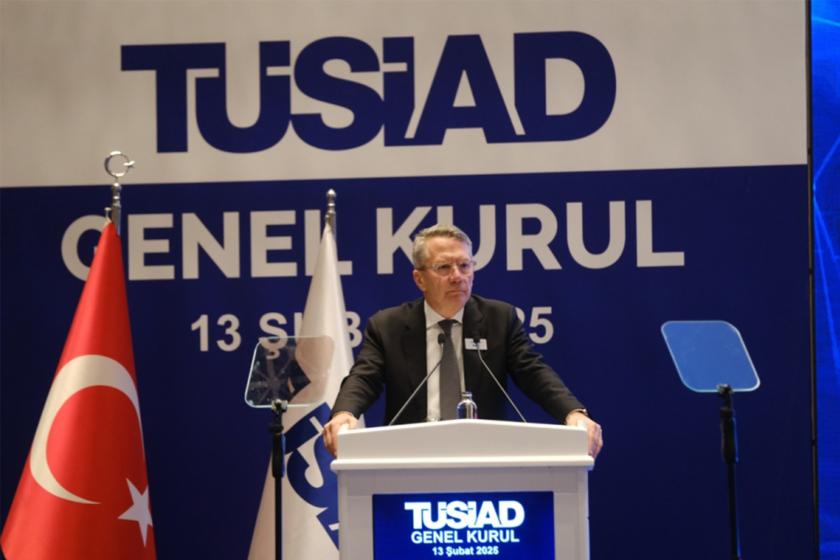
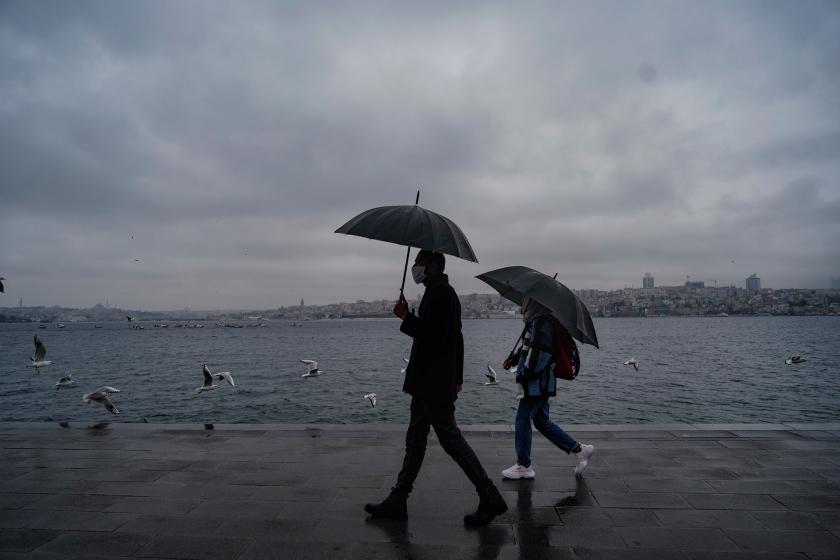










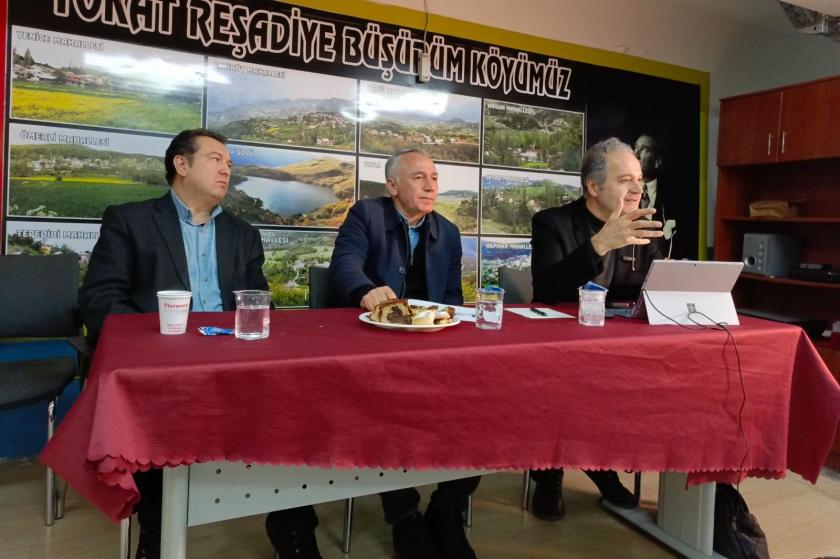
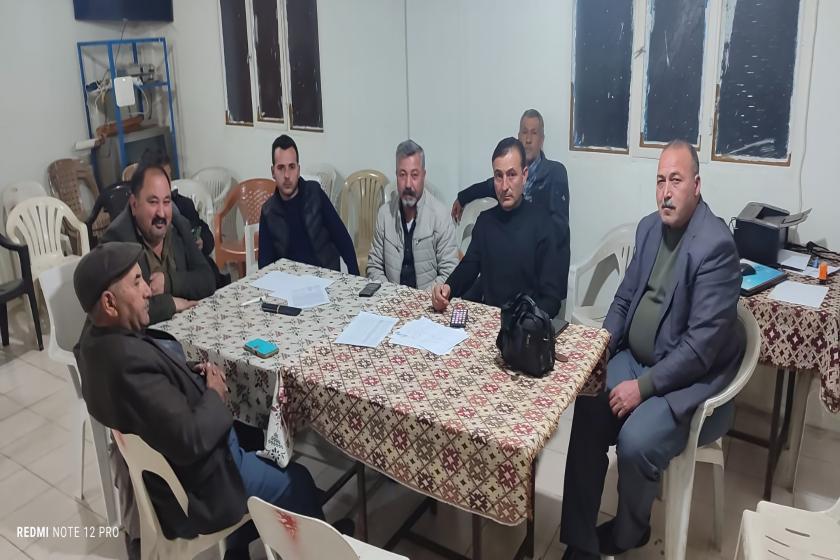

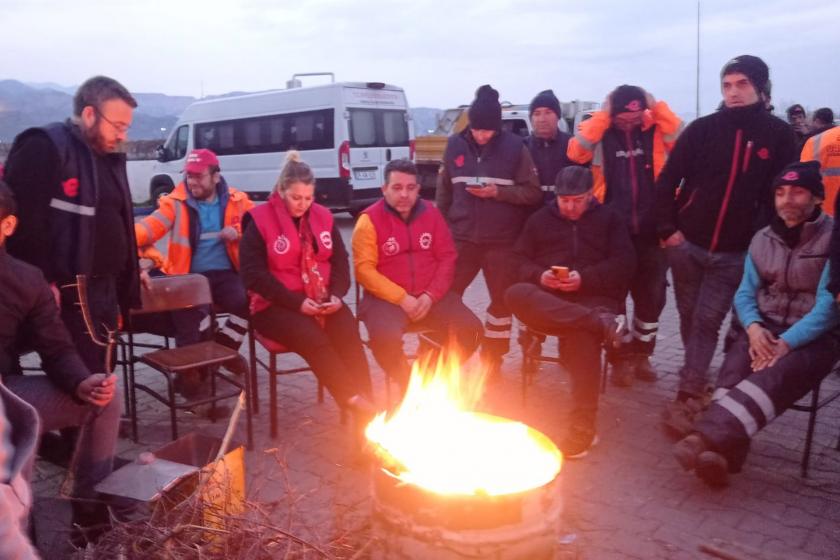
Evrensel'i Takip Et